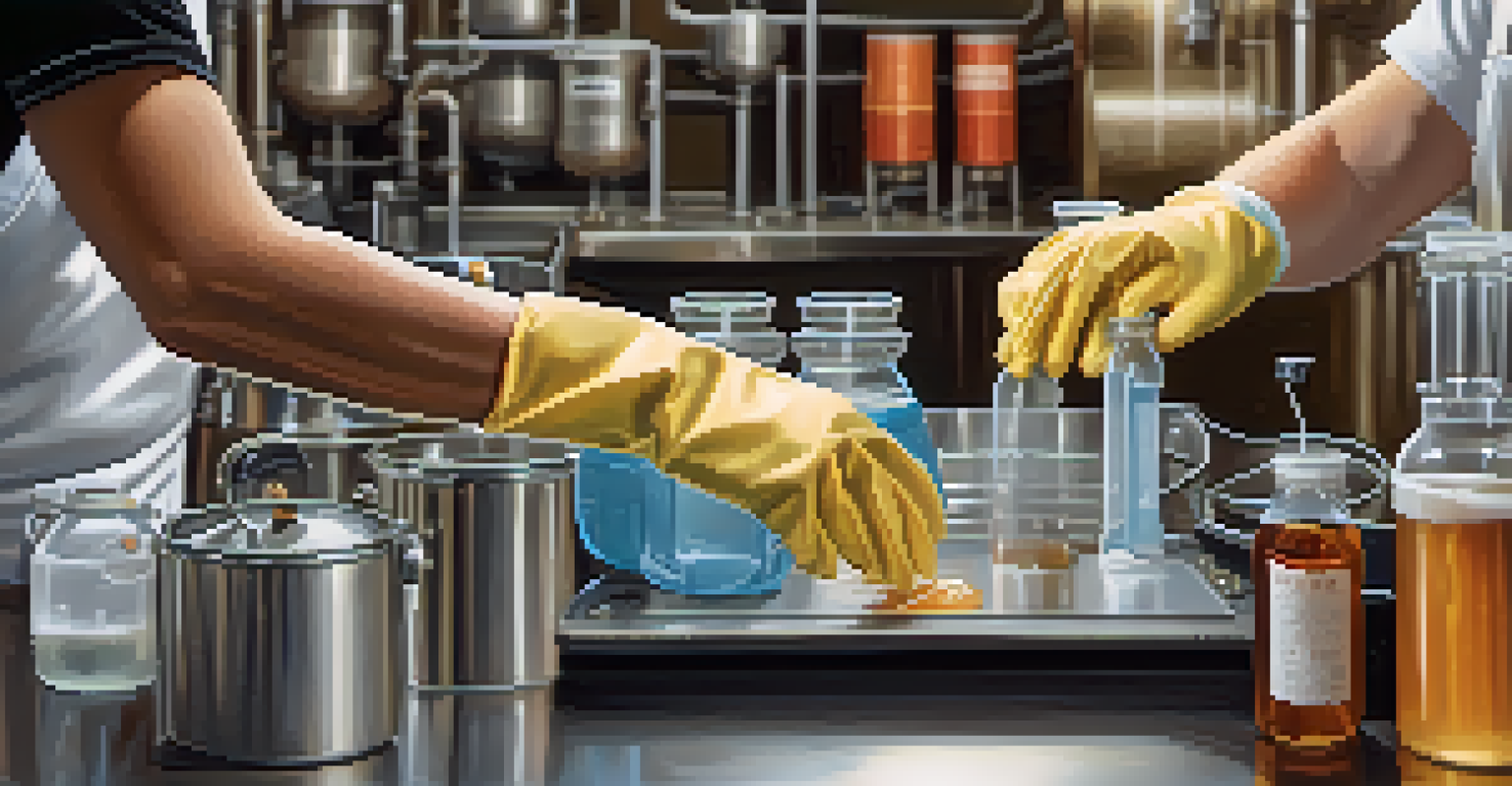Home Brewing Safety: Best Practices to Follow

Understanding the Importance of Home Brewing Safety
Home brewing can be a fun and rewarding hobby, but it comes with its own set of risks. Understanding these risks is the first step in ensuring a safe brewing experience. By prioritizing safety, you not only protect yourself but also enhance the quality of your brew.
Safety isn't just a slogan, it's a way of life.
The brewing process involves various equipment and ingredients, some of which can be hazardous if handled improperly. For example, handling boiling liquids or sanitizing solutions without proper care can lead to burns or skin irritation. Recognizing these dangers is crucial for any home brewer.
Moreover, practicing safety can prevent contamination, which could ruin your brew. By fostering a safe brewing environment, you’re taking proactive steps to create delicious, high-quality beer while enjoying the process.
Essential Equipment for Safe Brewing
Investing in the right equipment is vital for home brewing safety. Quality tools can help you manage risks more effectively, from fermentation vessels to heat sources. Make sure you are using equipment that is specifically designed for brewing to avoid accidents.

For instance, a sturdy brewing kettle can prevent spills and burns, while airlocks and fermentation chambers help control pressure. Additionally, having a reliable thermometer ensures that your wort temperature is optimal, reducing the risk of scorching.
Prioritize Brewing Safety
Understanding and managing risks in home brewing is essential to protect yourself and enhance the quality of your beer.
Don’t forget about personal protective equipment, too. Wearing gloves and goggles can safeguard you from spills and splashes, making your brewing experience not only enjoyable but also safe.
Cleaning and Sanitizing: The Cornerstone of Safety
Cleaning and sanitizing your equipment is one of the most important safety practices in home brewing. Bacteria and wild yeast can spoil your brew, leading to off-flavors and potential health risks. A clean environment is a happy environment for brewing.
An ounce of prevention is worth a pound of cure.
Use food-safe sanitizers and follow the manufacturer's instructions to ensure effectiveness. Remember, cleanliness starts before you even begin brewing, so always wash your hands and surfaces thoroughly.
By making cleaning and sanitizing a regular part of your brewing routine, you are not only ensuring a safe process but also improving the overall taste and quality of your final product.
Proper Handling of Ingredients
When brewing at home, it's crucial to handle ingredients with care. Many brewing ingredients, such as hops and malt, should be stored properly to maintain their quality. Improper storage can lead to spoilage, which could affect both safety and flavor.
Always check for expiration dates and signs of spoilage before using ingredients. Getting into the habit of inspecting your supplies ensures that you’re using the best possible products for your brew.
Essential Equipment Matters
Investing in quality brewing equipment and personal protective gear can significantly reduce safety risks during the brewing process.
Moreover, be cautious with additives, such as clarifying agents or adjuncts. Follow instructions carefully to avoid reactions that could compromise your safety or the quality of your beer.
Temperature Control: A Key Safety Factor
Temperature control is vital for both fermentation and safety in home brewing. Yeast thrives at specific temperatures, and going beyond those ranges can lead to unwanted flavors or even yeast death. Keeping your brewing environment stable ensures a successful fermentation.
Additionally, managing temperatures during the brewing process helps prevent injury. For instance, boiling wort needs constant attention to avoid overflows and burns. Having a reliable thermometer and a clear view of your setup can make all the difference.
By monitoring temperatures carefully, you not only protect your brew but also maintain a safe brewing environment, allowing you to focus on creating the perfect beer.
Fire Safety: Preventing Brewing Mishaps
Brewing often involves heat sources that can pose fire hazards if not managed properly. Whether you’re using a stovetop or an open flame outdoors, always keep a fire extinguisher nearby. This is a simple yet effective way to ensure safety during your brewing process.
Additionally, never leave your brewing equipment unattended while it’s in use. A moment of distraction could lead to serious accidents, such as boiling over or even igniting flammable materials nearby.
Cleanliness Is Key
Regular cleaning and sanitizing of your brewing equipment are crucial for preventing contamination and ensuring a safe brewing experience.
By staying vigilant and prepared, you can enjoy your brewing process without worrying about potential fire hazards. Remember, safety first ensures a fun and successful brewing experience!
Know Emergency Procedures and First Aid
In any hobby, being prepared for emergencies is crucial, and home brewing is no exception. Familiarizing yourself with basic first aid and emergency procedures can make a significant difference. For instance, knowing how to treat burns or allergic reactions can help you react swiftly in a crisis.
Keep a first aid kit handy in your brewing area, stocked with essentials like band-aids, antiseptic, and burn cream. This way, you're ready for minor accidents that could occur while brewing.

Additionally, understanding how to handle chemical spills or equipment malfunctions can prevent serious injuries. By being prepared, you not only enhance safety but also boost your confidence in your brewing abilities.